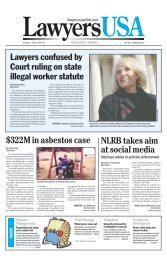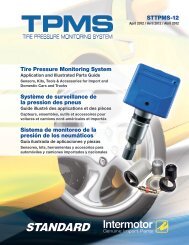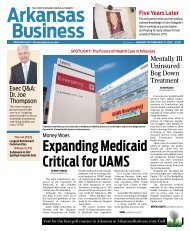New Jersey - Digital Publishing
New Jersey - Digital Publishing
New Jersey - Digital Publishing
Create successful ePaper yourself
Turn your PDF publications into a flip-book with our unique Google optimized e-Paper software.
LEASE<br />
> Continued from page 1<br />
asset would be recorded as an asset on the<br />
balance sheet, and the corresponding lease<br />
payments recorded as a liability.<br />
While capital or fi nance leases are<br />
recorded on the balance sheet, lease payments<br />
made under operating leases currently<br />
are recorded as expenses on a company’s<br />
income statement as they are incurred, and<br />
nothing is recorded on the balance sheet.<br />
The proposed changes — intended<br />
to provide more complete information to<br />
investors on the fi nancial effects of lease<br />
contracts — are expected to be fi nalized<br />
sometime this year, with implementation<br />
possible in 2013.<br />
“It’s going to be a dramatic change,”<br />
said Gary Illiano, national offi ce partner at<br />
accounting fi rm Grant Thornton, in <strong>New</strong><br />
York. “It affects anyone who has any kind of<br />
lease — it affects virtually every company.”<br />
If the change goes through, operating<br />
leases will be recorded on a company’s<br />
balance sheet, which could dramatically<br />
increase a fi rm’s assets and liabilities, and<br />
skew various metrics used to assess a company,<br />
Illiano said.<br />
Under current standards, a company<br />
with $10 million in assets, $8 million in liabilities<br />
and $2 million in equity has a 4-to-<br />
1 debt ratio, he said; under the proposed<br />
changes, a $10 million lease would increase<br />
assets and liabilities each by $10 million,<br />
creating a 9-to-1 debt ratio, he said.<br />
Such changes to a company’s balance<br />
sheet “may run afoul of existing debt<br />
Non-profit organizations have<br />
relied on our proactive approach<br />
to cost-effective business solutions<br />
and tax issues for more than 20 years.<br />
Nearly half of our clients operate<br />
in the non-profit sector. You can<br />
trust our CPAs and Consultants to<br />
be your advisors for the long-term.<br />
SGA Group is just right for your<br />
organization.<br />
covenants” with banks, said Marc E. Betesh,<br />
president and chief executive of KBA<br />
Lease Services, in Woodbridge. If a debt<br />
covenant restricts a borrower from having<br />
more than a certain amount in debt, “that<br />
may be violated by this change,” he said.<br />
In response to concerns raised by businesses,<br />
FASB and IASB tentatively decided at<br />
a joint board meeting last month to identify<br />
two different types of leases: a fi nance<br />
lease, which would have a profi t-or-loss<br />
effect consistent with the proposals, and<br />
an other-than-fi nance lease, with a profi tor-loss<br />
effect consistent with an operating<br />
lease under current accounting standards.<br />
The boards also tentatively agreed<br />
that renewal options would be considered<br />
part of the lease term only if there is a signifi<br />
cant economic incentive to extend the<br />
lease; the boards had previously proposed<br />
in their exposure draft that assets and liabilities<br />
would be recorded based on the<br />
longest likely possible term of the lease,<br />
taking into account any options to extend<br />
or terminate the lease.<br />
The boards are seeking input on their<br />
tentative decisions to determine whether<br />
stakeholders’ concerns would be addressed.<br />
While it was positive that the boards<br />
were recognizing concerns from businesses,<br />
said Jeff Milanaik, president of Heller<br />
Industrial Parks, in Edison, the proposed<br />
changes still lack clarity, and as long as<br />
there is uncertainty surrounding the lease<br />
accounting changes, “tenants are going<br />
to go for shorter lease terms, so it won’t<br />
adversely affect their balance sheets.” But<br />
landlords “like longevity in lease terms,”<br />
Assurance<br />
Tax<br />
Outsourced Solutions<br />
Consulting<br />
Just Right for You<br />
100 Walnut Avenue<br />
Suite 103<br />
Clark, NJ 07066<br />
732.381.8887<br />
info@sganj.com<br />
www.sganj.com<br />
which is benefi cial for securing fi nancing<br />
for buildings.<br />
Milanaik said he and other members<br />
of the commercial real estate industry submitted<br />
their objections to the proposed<br />
changes during the comment period,<br />
which ended Dec. 15, and are now awaiting<br />
the fi nal version of the proposals.<br />
Real estate owners need longer term<br />
leases to create value for their assets, said<br />
Ray Sohmer, executive vice president at<br />
commercial real estate services fi rm Jones<br />
Lang LaSalle. The timing of the accounting<br />
changes “is completely inappropriate,<br />
because of the negative pressure the economy<br />
had on the value of commercial real estate<br />
buildings,” he said. A short-term lease<br />
“is going to be negatively impacting value<br />
even further.”<br />
Meanwhile, the changes will “diminish<br />
the attractiveness of the renewal option,”<br />
Sohmer said. Tenants “use that option as<br />
leverage to renew,” he said. If a company<br />
indicates its intent to renew in an annual<br />
report, it loses that leverage.<br />
And regarding the boards’ tentative decision<br />
on renewal options, “it’s very unclear<br />
how to evaluate what a ‘signifi cant economic<br />
benefi t’ is and equate it to some probability<br />
they’re going to renew,” he said.<br />
Under the existing accounting rules,<br />
“it was sometimes more advantageous to<br />
lease a property, because a lease did not<br />
show up on the fi nancial statements,”<br />
Betesh said. Under the proposed rules,<br />
though, “there may be no material difference<br />
in whether you buy or lease.”<br />
The most immediate impact of the<br />
Impact of changes<br />
■ Only 7 percent of executives felt<br />
their companies were very prepared<br />
to comply with the new lease accounting<br />
standards, according to a survey<br />
released by accounting and consulting<br />
fi r m Deloitte last month.<br />
■ More than 80 percent said the<br />
new standards will place a signifi cant<br />
burden on fi nancial reporting for both<br />
tenants and owners.<br />
■ More than 40 percent believe the<br />
new standards would make it more diffi<br />
cult to obtain fi nancing.<br />
– Evelyn Lee<br />
new standards would be “the huge administrative<br />
burden for the accounting industry<br />
and the business community,” Betesh<br />
said. Companies will be required to organize<br />
all of their lease documents, so they<br />
can properly analyze the current and projected<br />
costs of their leases, he said.<br />
“A lot of accounting fi rms don’t have<br />
a lot of expertise in real estate leases,” and<br />
may not know how to determine the proper<br />
allocation of costs, or project the future<br />
costs of such leases, Betesh said. And the<br />
need for companies to seek, and pay for,<br />
more assistance from their accounting<br />
fi rms would essentially amount to “an unfair<br />
tax on small business,” especially for<br />
<strong>New</strong> <strong>Jersey</strong>’s signifi cant small and midsized<br />
business population, Sohmer said.<br />
E-mail to: elee@njbiz.com<br />
unitybank.com 1.800.618.BANK (2265)<br />
Green Light<br />
your business<br />
growing with you!<br />
www.njbiz.com njbiz ◆ March 7, 2011 7
















